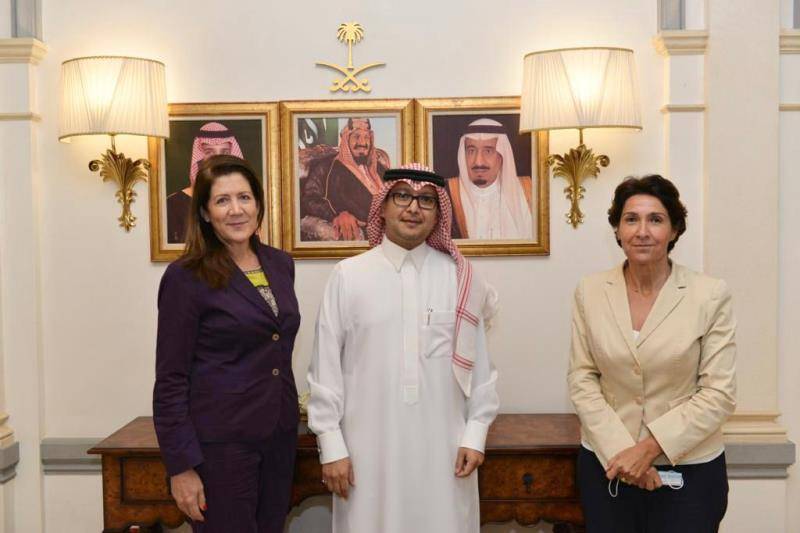
Ambassadors to Lebanon —France Ambassador Anne Grillo, American Ambassador Dorothy Shea and Saudi Ambassador Walid Boukhari — in Yarze, Lebanon, on July 12, 2021. (Credit: Photo National News Agency)
At the Paris meeting on Feb. 6, the United States, France, Saudi Arabia, Egypt and Qatar unanimously agreed to sanction Lebanese officials who are blocking the election of a new president.
Western and Arab sources involved in the negotiations confirmed this to L’Orient-Le Jour, on condition of anonymity due to the sensitivity of the topic.
“We are determined. The tone will not be the same,” said one of the sources.
The modus operandi on which the five countries have agreed is irreversible, according to the same sources: They are moving to Plan B, which is a fully firm and intransigent tone.
This is the first time that five major powers have coordinated to raise the specter of sanctions in Lebanon.
The United States already has a large arsenal of legislation at its disposal, which it has used against numerous Lebanese figures, most of whom are in Hezbollah’s orbit. Free Patriotic Movement (FPM) leader Gebran Bassil and the Amal movement’s MPs Ali Hassan Khalil and Ghazi Zeaiter are among the political heavyweights already sanctioned by Washington.
France, which raised the possibility of sanctioning Lebanese leaders in the aftermath of the Aug. 4 explosion, finally decided to involve European partners.
In July 2021, the European Union adopted a framework for imposing sanctions against individuals or entities in Lebanon responsible for undermining democracy or the rule of law.
The “actions” that the EU considers sanctionable include obstructing the democratic political process by seriously undermining the holding of elections. Paris could also impose other measures deemed appropriate in due course. It is unclear, however, which measures the Arab participants in the Paris Meeting might take in turn.
However, questions need to be answered on the timing and the target of these sanctions.
L’Orient-Le Jour learned from the above-mentioned sources that timing was discussed at the Paris meeting. A tight deadline to elect a president could reduce the chance of an electoral breakthrough as the political establishment has not had enough time to reach an agreement.
The opposite is likely to be equally unsuccessful. If the deadline is too lenient, Lebanese politicians might “rest on their laurels” and continue blocking the election of a president, said one of the sources.
As a result, a “natural” deadline that marks a transition to new phases in the country’s public life will be taken into account. For instance, the end of central bank Governor Riad Salameh’s term in June could be one potential natural deadline.
This date, which is deemed sensitive, will weigh heavily on Lebanon’s already extremely precarious financial situation. Clearly, Salameh’s successor will be crucial to the implementation of reforms expected by the international community, which is now convinced that the current political elite have effectively demonstrated their reluctance to initiate any kind of required change.
‘We know what the intentions of each side are’
How to identify those who are blocking the elections?
Hezbollah and Amal are accused of paralyzing the second round of voting for a president, but will the two parties still be blamed now that they’ve officially announced their endorsement of Marada Movement leader Sleiman Frangieh? What about the FPM, which continues to reject the candidacies of Frangieh, Army Chief Joseph Aoun and Michel Moawad, who has been supported by the Lebanese Forces (LF), the Progressive Socialist Party (PSP) and the independents, among others?
The LF, which had promised to ensure a quorum if the parties agreed on a candidate, recently said it would do everything possible to prevent a quorum for the election of the Marada leader. If this is the case, will the LF MPs — whose leader is known to be close to Riyadh — be sanctioned for their behavior?
“We know exactly what the intentions of each [side] are and who is really blocking [the elections],”s aid one of the above-mentioned sources. “Moreover, it is often the political actors themselves who accuse each other and expose each other. It will not be difficult to identify those who are blocking the process.”
In Paris, it was suggested that some parties are taking pleasure in Lebanon’s institutional chaos and do not really want an election, according to the source.
The Maronite Church
Will sanctions be effective?
A large part of the March 8 camp has already been sanctioned, but that did not fundamentally change its political behavior. The five participants of the Paris meeting are well aware that sanctions — already tested in Lebanon — can have some degree of effectiveness, but this will remain limited if unaccompanied by an internal dynamic.
The idea is therefore to rely on a “lobby” emanating from local political actors, like the Maronite Church or “other actors from this community,” said the above-mentioned source.
The other consideration would be an electoral breakthrough based on a regional compromise that would occur following the rapprochement between Iran and Saudi Arabia.
For the time being, Saudi officials do not seem to consider the agreement to be one that could benefit Lebanon.
“What Lebanon needs is a Lebanese rapprochement, not a Lebanese-Iranian-Saudi rapprochement,” said Prince Faisal bin Farhan to Al-Arabiya TV channel on Friday.“Lebanon must see where its interest lies. The political leaders must put the Lebanese interest above all others.”
“When the decision to build the Lebanese state is made, the country will certainly flourish and Saudi Arabia will stand by its side,” he added.
This article was originally published in French in L'Orient-Le Jour. Translation by Joelle El Khoury.